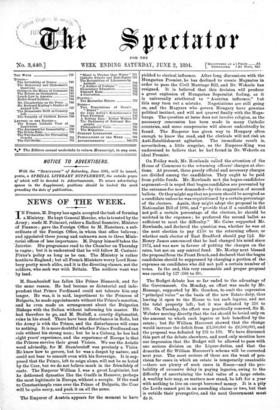On Friday week, Mr. Rowlands called the attention of the
House of Commons to the returning officers' charges at elec- tions. At present, these purely official and necessary charges are divided among the candidates. They ought to be paid from public funds. Mr. Rowlands met the bogus-candidates argument—it is urged that bogus candidates are prevented by the entrance-fee now demanded—by the suggestion of second ballots. Or they might say that no person should be accepted as a candidate unless he was requisitioned by a certain percentage of the electors. Again, they might adopt the proposal in the Nationalist Bill of 1886, and "provide that if a candidate did not poll a certain percentage of the electors, he should be mulcted in the expenses ; he preferred the second ballot as sufficient to meet the difficulty." Mr. Caine supported Mr. Rowlands, and declared the question was, whether he was at the next election to pay £150 to the returning officer, or whether each elector of East Bradford should pay lid. Sir Henry James announced that he had changed his mind since 1872, and was now in favour of putting the charges on the rates, but not on any central fund. Mr. Morley next blessed the proposal from the Front Bench, and declared that the bogus candidates should be suppressed by charging a portion of the expenses on candidates who did not poll a certain number of votes. In the end, this very reasonable and proper proposal was carried by 127 (166 to 39).






































